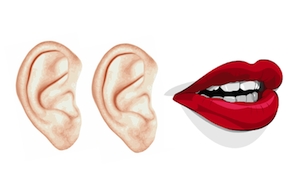As a social confidence coach, I work regularly with guys who struggle with keeping conversations going. In particular, they have trouble prolonging discussions with members of the opposite sex, which is why how to keep a conversation going with a girl is a topic that I often address.
There is a lot of advice out there on how to talk to girls, and there are numerous approaches, from using memorized lines, to playing the nice guy, to bombarding her with questions.
I like to think that my approach differentiates itself from the majority because I don’t teach guys superficial gimmicks or routines, and I don’t encourage them to be fake. I help them understand female psychology and social dynamics, gain social confidence and build real social skills with women.
There are a few tried and tested ideas regarding how to keep a conversation going with a girl that truly work very well, and I constantly encourage my coaching clients to apply them. I’d like to share them with you, one by one.
Step 1: Stop Romanticizing Women
Almost every guy I know who has trouble keeping conversation going with girls has this strong inclination to romanticize women. They see women as flawless, especially beautiful ones, they think women in general are above them and hard to impress, and they believe they must always say something brilliant in conversation in order to keep a women’s interest.
This mindset is very far from reality, and it makes it hard for them to hold a conversation with girl. They don’t see anything they have to say as good enough, they pressure themselves to be witty with every comment they make, and thus they end up having little to say in a discussion.
This is why it’s imperative to stop romanticizing women. It will allow you to relax around women, be confident, and speak your mind without second guessing yourself all the time. And this is a very attractive behavior, which coincidentally also makes conversation feel effortless.
Of course, to stop romanticizing women is easier said than done. We’re talking about changing a thinking and behavioral habit, which requires particular psychological techniques. To dig into them, watch this instructional presentation in which I discuss this subject separately and more thoroughly.
Step 2: Find out Her Interests
Guys often have a hard time knowing what to talk about with a girl because they don’t know her interests. They may think: “I can talk about computers, because I’m interested in this subject; but will she be interested?”
 One way to solve this predicament is by trial and error. You begin talking about a certain topic that you think she might be interested in, and if she does indeed seem interested, you keep talking about it. If not, you move to another topic, and another, and another, seeking to find those that she can relate to. And this is a natural part of a regular conversation.
One way to solve this predicament is by trial and error. You begin talking about a certain topic that you think she might be interested in, and if she does indeed seem interested, you keep talking about it. If not, you move to another topic, and another, and another, seeking to find those that she can relate to. And this is a natural part of a regular conversation.
However, there is an even better way to deal with this predicament. Early in the conversation, you ask the girl a simple, straightforward question that elicits her interests. I usually like to ask something like: “So, what do you like to do?” or “Tell me: what are your interests?”
She will mention a few of them, and then I know what I can talk about that she’ll enjoy. I then identify among those topics the ones I enjoy as well, and I know these are directions I can confidently take the conversation in. This is how to keep a conversation going with a girl by finding common ground.
Step 3: Talk Some about Yourself
There is this popular idea that to keep a conversation going with a girl you just met, you have to ask her lots of questions, because everybody loves to talk about themselves, and not talk too much about yourself, because you’ll appear self-absorbed.
I don’t know who first came up with this idea, but in all seriousness I doubt they had many experiences talking to women. Because in practice, this idea rarely holds water.
You need to realize that when you’re talking with a girl you just met, to her, you are mostly a stranger. She knows almost nothing about you. And a girl isn’t gonna feel comfortable answering a long line of personal questions from a guy she knows almost nothing about. I can’t tell you how many girls have confessed this to me.
For this reason it’s important when you’re talking to a girl to combine asking her questions with talking about yourself. It is this mix of her talking, you talking, her talking some more, you talking some more, that makes the conversation move forward and helps both of you become comfortable with each other. And that’s exactly what you want.
Typically, you may hesitate to talk about yourself, and because you lack practice, you may not be very good at it either. But this is something that you can only overcome with practice. So try to be more talkative and talk more about yourself. With experience you’ll get better at it and it will get a lot easier as well.
Step 4: Manage Your Anxiety
Guys who want to learn how to keep a conversation going with a girl typically feel a lot of anxiety when talking to girls, or even just thinking about it. Their heart races, their mind often goes blank, and this naturally makes dialogue difficult.
Nearly every time, this anxiety is the real root of the problem. Not a lack of conversation skills; or at least, not as much. And if you wanna be able to make effortless conversation with a girl, you need to weed out the problem from its root.
In other words, you need to learn how to manage your anxiety around girls, so you can feel at ease talking to any girl. Then you’ll naturally be able to have conversations as long as you want.
Since this is an intricate topic, I address it separately and in more detail in this special video. I recommend you watch it right now, because in it you’ll learn some of the most powerful information in existence about eliminating conversation anxiety and building conversation confidence. So make sure you watch it.
I know talking to a girl may be difficult for you right now. But trust me, this can completely change. Yes, it will take some work. You have to learn to deal with your nervousness, and you need to create better conversation habits for yourself.
The good news is that there are quality resources and specialists ready to assist you on this journey. If you haven’t already, I invite you to join my free social confidence newsletter, and you’ll receive regular advice from me for improving your social confidence and social skills.
Your social life is in your hands. Make the best of it.
Image courtesy of Rares Dutu

 Jonny Gibaud
Jonny Gibaud 